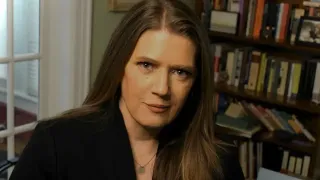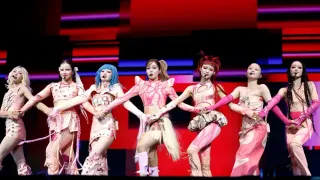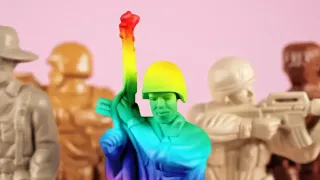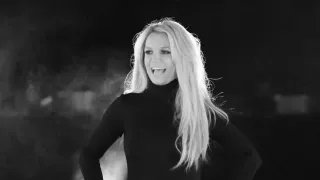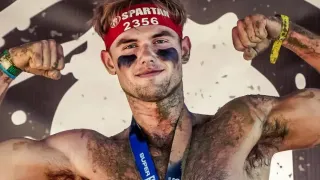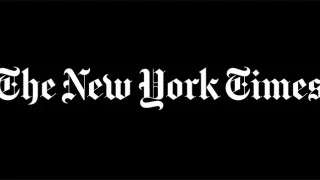September 22, 2022
'Bros' - Billy Eichner and Luke MacFarlane on Their Big Gay Rom-com
Brian Bromberger READ TIME: 11 MIN.
Promoted as the first romantic comedy from a major studio (Universal) about two gay men and the first studio film in history with an entirely LGBTQ principal cast, "Bros" finally arrives in San Francisco on September 29, after a sneak preview at the Castro Theatre on Sept 11.
Co-writer and star comedian Billy Eichner ("Billy on the Street," "Difficult People") explained in an interview, along with co-star Luke MacFarlane, with the Bay Area Reporter at the Ritz Carlton Hotel, why it was essential to cast all the roles in that way.
"The movie itself was becoming about allowing queer people to tell our own stories, to control our own stories," said Eichner. "It felt like we needed to use this as an opportunity to populate the movie with openly LGBTQ actors and actresses [i.e. Jai Rodriguez, Amanda Bearse, Bowen Yang, Harvey Fierstein], trans people, and non-binary people who simply have not had these opportunities before based solely on who they were in their personal lives, which makes no sense."
Bobby, Baby
The main character, Bobby Leiber, played by Eichner, will go on a rant: "Why can't gay actors ever play straight, but straight actors can play gay and they win Oscars?" While it is doubtful Eichner, or any other cast member, will be winning any Oscars for "Bros," the film does correct the imbalance as to who gets opportunities to act in a queer movie.
Clearly a labor of love that exudes snarky charm, by conforming to Hollywood conventions of a rom-com, rather than revolutionizing the genre and perhaps introducing some ambiguity into its clichéd format, "Bros" mainstreams queerness so audiences will see little distinctiveness or what might make a gay rom-com unique. An opportunity squandered for some, but, perhaps for many, its formulaic normalization of LGBTQ people will be sufficient to make it ground-breaking.
40-year-old Bobby hosts a popular podcast on queer history called "11th Brick" (because, as a white cis man, that's the one he probably threw at Stonewall), but is also the militant director of the first national LGBTQ history museum (i.e. promoting, controversially, a gay Abraham Lincoln exhibit) consisting of a feuding Board; a butch lesbian, an angry bisexual ("Why do lesbians get a month for their history and we only get a week!"), a Black trans person, and a nondescript nonbinary. Bobby also writes books and gives speeches, and even auditions unsuccessfully for "Queer Eye."
Rejecting the notion love is love, exclaiming "gay men are different," as a commitment-phobe, Bobby hooks up with guys on dating apps (i.e. Zellweger, where gay men can talk about actresses, then go to bed and have sex) when he's horny.
In a nightclub he meets gym bunny and sports-loving Aaron (a shirtless, ripped Macfarlane), an emotionally unavailable estate lawyer who injects testosterone. Professionally, he'd rather be a chocolatier.
Aaron is en route to participate in a threesome with a male couple for the evening. In a classic opposites-attract scenario, the film explores, Eichner explained, in a "funny but realistic manner, how two men priding themselves on not needing a relationship, who are strong and self-reliant, fall for each other and stumble into love."
The film satirizes aspects of gay subculture, such as gym workout obsessions ("Look at that ripped 65-year-old. It's like he injected steroids into Dumbledore!"), Grindr hookups ("Had sex with a guy who wanted to pee on me. Are you into that? No, but I had nothing else to do.")
In one hilarious episode, Bobby cuts himself while shaving his rear end for an ass pic. Thruples, intra-queer politics, Hallmark Christmas specials (with titles like "Have Yourself a Holly Poly(amorous) Christmas"), films ("Straight people love seeing us miserable"), and history get funny jibes (Pink Triangle Silence=Death Box of Chocolates).
The clever repartee is witty and savage, delivered mostly by an opinionated, anxiety-ridden, fast-talking, abrasive Eichner, which at times overshadows the romance. Whether audiences will embrace such a gay Woody Allen-like angry, judgmental character ("Not all gay people are nice") remains to be seen. Eichner is as intense in real life as he is on screen.
Glad Romance
"The whole idea for the movie started with my co-writer and director Nick Stoller, who came to me and said he wanted his next movie to be a romantic comedy, but he thought it would be cool if it would be about a gay couple, because we hadn't had many of those," said Eichner. "Judd Apatow would produce. Nick acknowledged he's straight, so he asked if I would write it with him. I educated him on gay culture, and he educated me on how to structure a screenplay for a major studio. It wound up becoming a five-year process."
Originally, Eichner thought it would be an indie movie or a streaming film, which have always been more welcome avenues for queer stories.
"I kept telling Judd and Nick – those guys have a long history of making mainstream and very successful comedies ("Bridesmaids," "Knocked Up") with Universal – that having been an openly gay man in Hollywood for 20 years and told I was too gay, no major studio would do it or make it in an honest, authentic way. But they kept saying, 'I think they will.' We went in, pitched it, and much to my surprise, they were very enthusiastic.
"I had seen many gay indie films in theaters, such as 'Broken Hearts Club,' 'Jeffrey,' 'Edge of Seventeen,' and loved them,' said Eichner. "The thing that is different about 'Bros' isn't the creative element, but the scale it is produced and at which it is being distributed. It's being released theatrically exclusively, which is major at a time when Universal could just as easily have said, 'Let's just put this on Peacock,' a safer bet.
"It's being screened in 3,000 multiplexes in North America, then throughout the world. For an R-rated gay rom-com, this is a big deal and should've happened long ago. To see a movie in a theater is uniquely fun, powerful, and magical, as you get to escape the world in a communal setting, laughing together with hundreds of people."
Luke's Warm
For MacFarlane, who has played both gay and straight roles, such as the gay Scotty on "Brothers & Sisters," Rec Agent D'avin Jaqobis on the Space TV science fiction series "Killjoys," and the romantic lead on Hallmark Channel Christmas movies, Aaron has enabled him to "tell the authentic version that is closest to himself," he said. "Aaron is definitely not me, but he's a lot closer than other characters I've played."
MacFarlane doesn't mind being a heartthrob to millions of straight women.
"I'm an actor," he said. "I work for a living and I take the jobs when they come. I like transforming, and Hallmark has been very good to me. Through these different roles I've learned about storytelling. How lucky it was for my career when I came out as a gay man 14 years ago and somebody remembered that, and now through 'Bros' I get a chance to celebrate having done so."
When asked if it's less difficult today to be an openly gay actor in Hollywood, MacFarlane commented, "It's hard to say."
However, for Eichner, "It's definitely not easy, but it's easier, as the industry feels pressure and almost a cultural mandate to be more welcoming and inclusive, and not just LGBTQ folk, but people from all marginalized communities. Now, it has taken way too long. I want to see more LGBTQ actors getting to embody themselves on screen. We need more queer powers behind the scenes that will help the industry evolve more, though it has come a long way."
Equity and Opportunity
Eichner doesn't think gay actors should only play gay roles.
"There shouldn't be any rules applied to art, which is a liberating force," he said. "But art isn't made in a vacuum, and a lot of money is at stake here, so it's about equity and opportunity, creatively and financially.
He continued, "We're trying to correct an imbalance we've seen in Hollywood, where we were literally not allowed to do anything if you were openly LGBTQ. The studios would tell you they needed a movie star, so they couldn't cast an LGBTQ actor, but then you ask whose fault was that, because for so long they didn't let LGBTQ actors become stars, so how are we supposed to be the movie stars you are relying on for the box office?"
Eichner claims his digs at the gay lifestyle weren't meant to be satirical.
"The cool thing about having an all-LGBTQ cast is that it allowed us to poke fun at ourselves, which is what we do a lot in our community. It didn't have to be this sanctimonious thing where we were walking on eggshells. We wanted to capture life and make it complex, messy in relatable ways, to reflect the life I lead."
As for the criticism that once again there are white men leading on and off screen, Eichner declared, "I wanted to write from my own experience, for better or worse. I'm a gay cis white man – no one's proud of it, but that is just a fact, and I'm writing my own story, where I can bring nuance and depth because I've lived this life. I hope it opens the door to many more studios telling love stories, comedic stories from the perspective of people from all corners of the globe."
"Bros" centers on masculinity and the inability of men, especially gay men, to be vulnerable and comfortable in who they are, even if that means eroticizing stereotypical masculinity.
MacFarlane said, "With all men it goes back to genetic forces, the hunter/gatherer being strong and not willing to reveal himself. You can't fall in love until you put aside those ideas about being the strongest and biggest, and be willing to get hurt."
Eichner references Bobby's insecurity about his looks, his body, and his masculinity.
"So he's at the gym working out and seeing a hot guy. They make eyes at each other. Bobby walks over to flirt with him, but he makes a last-minute decision to change the way he's walking. He turns his baseball cap around to seem more like a bro and makes his voice much deeper than it normally is. He changes his personality in order to seem more attractive."
Code-switching
For Eichner personally, he didn't struggle with being gay. "I'm sure other people did. My struggle was with masculine versus feminine or masculine versus flamboyant. I'm gay, but I still want to be a bro, though I don't feel this way anymore. Still, sometimes unknowingly, I drop my voice several octaves as a way of code-switching so as not to alienate straight people.
"The culture at large puts masculinity on a pedestal, whether it be superheroes, action stars, or athletes," Eichner said. "We all worship these 'roided-out bodies, and they are all tough. It's about violence and physical strength. In order to be in a committed, long-term relationship, you have to be willing to let your guard down. That is something men, straight and gay, find challenging, and that is what 'Bros' is about: Two men who are both intimidated by, and scared of, each other."
Finally, Eichner maintains that while there are certainly aspects of straight dating, romances, and love that are similar to gay relationships, there are many things dissimilar.
"Modern, urban gay men in the last fifty years have created their own rules when it comes to monogamy, love, and sex, especially in terms of what is ethical, so 'Bros' is a humorous reflection on how complex, exciting, and different that all is.
"What's so great is reaching an audience of straight people who will not only laugh a lot as they would at any Judd Apatow movie, but they will also be getting a peek behind the curtain at a culture they think they may know, having seen wacky gay characters on sitcoms. But they've never seen dealt with in such a nuanced, specific way as we've dealt with it. Everything here is relatable and universal. Hopefully, the audiences will realize stories are stories, no matter what group they come from."
Help keep the Bay Area Reporter going in these tough times. To support local, independent, LGBTQ journalism, consider becoming a BAR member.
